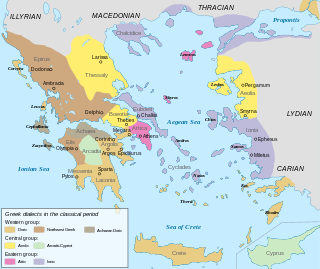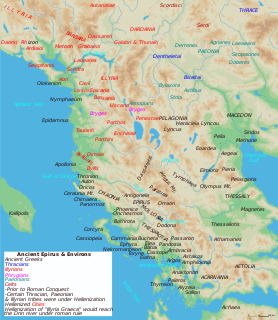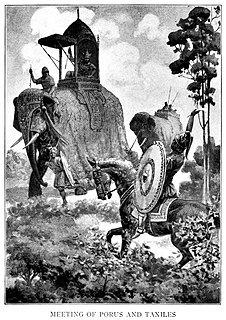Related Research Articles

Macedonia, also called Macedon, was an ancient kingdom on the periphery of Archaic and Classical Greece, and later the dominant state of Hellenistic Greece. The kingdom was founded and initially ruled by the royal Argead dynasty, which was followed by the Antipatrid and Antigonid dynasties. Home to the ancient Macedonians, the earliest kingdom was centered on the northeastern part of the Greek peninsula, and bordered by Epirus to the west, Paeonia to the north, Thrace to the east and Thessaly to the south.

Pamphylia was a former region in the south of Asia Minor, between Lycia and Cilicia, extending from the Mediterranean to Mount Taurus. It was bounded on the north by Pisidia and was therefore a country of small extent, having a coast-line of only about 120 km with a breadth of about 50 km. Under the Roman administration the term Pamphylia was extended so as to include Pisidia and the whole tract up to the frontiers of Phrygia and Lycaonia, and in this wider sense it is employed by Ptolemy.

Doric, or Dorian was an Ancient Greek dialect. Its variants were spoken in the southern and eastern Peloponnese as well as in Sicily, Epirus, Southern Italy, Crete, Rhodes, some islands in the southern Aegean Sea and some cities on the south east coast of Anatolia. Together with Northwest Greek, it forms the "Western group" of classical Greek dialects. By Hellenistic times, under the Achaean League, an Achaean-Doric koiné language appeared, exhibiting many peculiarities common to all Doric dialects, which delayed the spread of the Attic-based Koine Greek to the Peloponnese until the 2nd century BC.

Alexander I of Macedon, known with the title Philhellene was the ruler of the ancient Greek kingdom of Macedon from c. 498 BC until his death in 454 BC. He was succeeded by his eldest son, Alcetas II.
Ancient Macedonian, the language of the ancient Macedonians, either a dialect of Ancient Greek, or a separate Hellenic language, was spoken in the kingdom of Macedonia during the 1st millennium BC and belongs to the Indo-European language family. It gradually fell out of use during the 4th century BC, marginalized by the use of Attic Greek by the Macedonian aristocracy, the Ancient Greek dialect that became the basis of Koine Greek, the lingua franca of the Hellenistic period.

Elimiotis or Elimeia was a region of Upper Macedonia that was located along the Haliacmon river. It was bordered by Orestis and Eordaea in the north, Pieria in the east, Perrhaebia/Thessaly in the south and Parauaea in the west, and was inhabited by the Greek tribe of Elimiotes. In earlier times, it was independent and the Derdas family ruled the local kingdom from its capital Aiane. However, later it lost its independence and by 355 BC, Elimiotis was part of the Kingdom of Macedon.

The Thesprotians were an ancient Greek tribe and kingdom of Thesprotis, Epirus, akin to the Molossians. The poet Homer frequently mentions Thesprotia which had friendly relations with Ithaca and Doulichi. On their northeast frontier they had the Chaonians and to the north the kingdom of the Molossians. The Thesprotians originally controlled the Dodona oracle, the oldest in Greece. Later, they were part of the Epirus until they were annexed into the Roman Empire.

Taxiles was the Greek chroniclers' name for a prince or king who reigned over the tract between the Indus and the Jhelum (Hydaspes) Rivers in the Punjab region of the Indian subcontinent at the time of Alexander the Great's expedition. His local name was Ambhi, and the Greeks appear to have called him Taxiles or Taxilas, from the name of his capital city of Taxila, near the modern city of Attock, Pakistan.

The Chaonians were an ancient Epirote tribe that inhabited the region of Epirus located in the north-west of modern Greece and southern Albania. On their southern frontier lay another Epirote kingdom, that of the Molossians, to their southwest stood the kingdom of the Thesprotians, and to their north lived the Illyrian tribes. According to Virgil, Chaon was the eponymous ancestor of the Chaonians. By the 5th century BC, they had conquered and combined to a large degree with the neighboring Thesprotians and Molossians. The Chaonians were part of the Epirote League until 170 BC when their territory was annexed by the Roman Republic.
Atalanta or Allante (Ἀλλάντη) or Allantium was an ancient city of Bottiaea, ancient Macedon, between Gortynia and Europos, in the upper part of the valley of the Axius river, which may have been built by the Bottiaeans before their expulsion by Macedonians to Bottike. Axioupoli of today's Kilkis regional unit claims to be the ancient location. N. G. L. Hammond places it between Athyra, Pella regional unit and Koufalia, Thessaloniki regional unit
The Second Sacred War was the Spartan defeat of Phocians at Delphi and the restoration of Delphian self-control.
Machatas may refer to:
Hegelochus or Hegelochos may refer to:
Charops or Charopus is the name of two statesmen in 2nd century BC of the Epirote League, grandfather and grandson; both of them had the patronymic Machatas.

Proxeny or proxenia in ancient Greece was an arrangement whereby a citizen hosted foreign ambassadors at his own expense, in return for honorary titles from the state. The citizen was called proxenos or proxeinos (πρόξεινος). The proxeny decrees, which amount to letters patent and resolutions of appreciation were issued by one state to a citizen of another for service as proxenos, a kind of honorary consul looking after the interests of the other state's citizens. A cliché phrase is euergetes (benefactor) and proxenos.

Ichnae or Ichnai an ancient town of Bottiaea, Macedonia on the Thermaic Gulf, above the mouth of Loudias river, near modern Koufalia ; built by the Macedonians according to Hazlitt, although Ichnaeans appear independently in epigraphy. It is mentioned by Herodotus, coupled with Pella.
Europus was a town in Bottiaea, ancient Macedonia. It was located between Idomenae and the plains of Cyrrhus and Pella, probably situated on the right bank of the Axius below Idomene. Not far above the entrance of the great maritime plain, the site of Europus may perhaps hereafter be recognised by that strength of position which enabled it to resist Sitalces and the Thracians. We have the concurring testimony of Ptolemy and Pliny that this town of Emathia was different from Europus of Almopia.

The regions of ancient Greece were areas identified by the ancient Greeks as geographical sub-divisions of the Hellenic world. These regions are described in the works of ancient historians and geographers, and in the legends and myths of the ancient Greeks.
Derdas III was archon of Elimiotis in Upper Macedonia in 360–355 BC. He was probably a son of Derdas II. He had a brother named Machatas and a sister Phila, who was one of the first women Philip II of Macedon married.
References
- FD III 4:405 Delphi — 325–300 BC
- Christian Marek (1984). Die Proxenie. p. 220. ISBN 3-8204-7595-8.
- Ian Worthington (2003). Alexander the Great: A Reader . Psychology Press. p. 26. ISBN 978-0-415-29186-6.
- A History of Macedonia: Historical geography and prehistory by N. G. L. Hammond v.1 (1972), p. 168 ISBN 0-19-814294-3